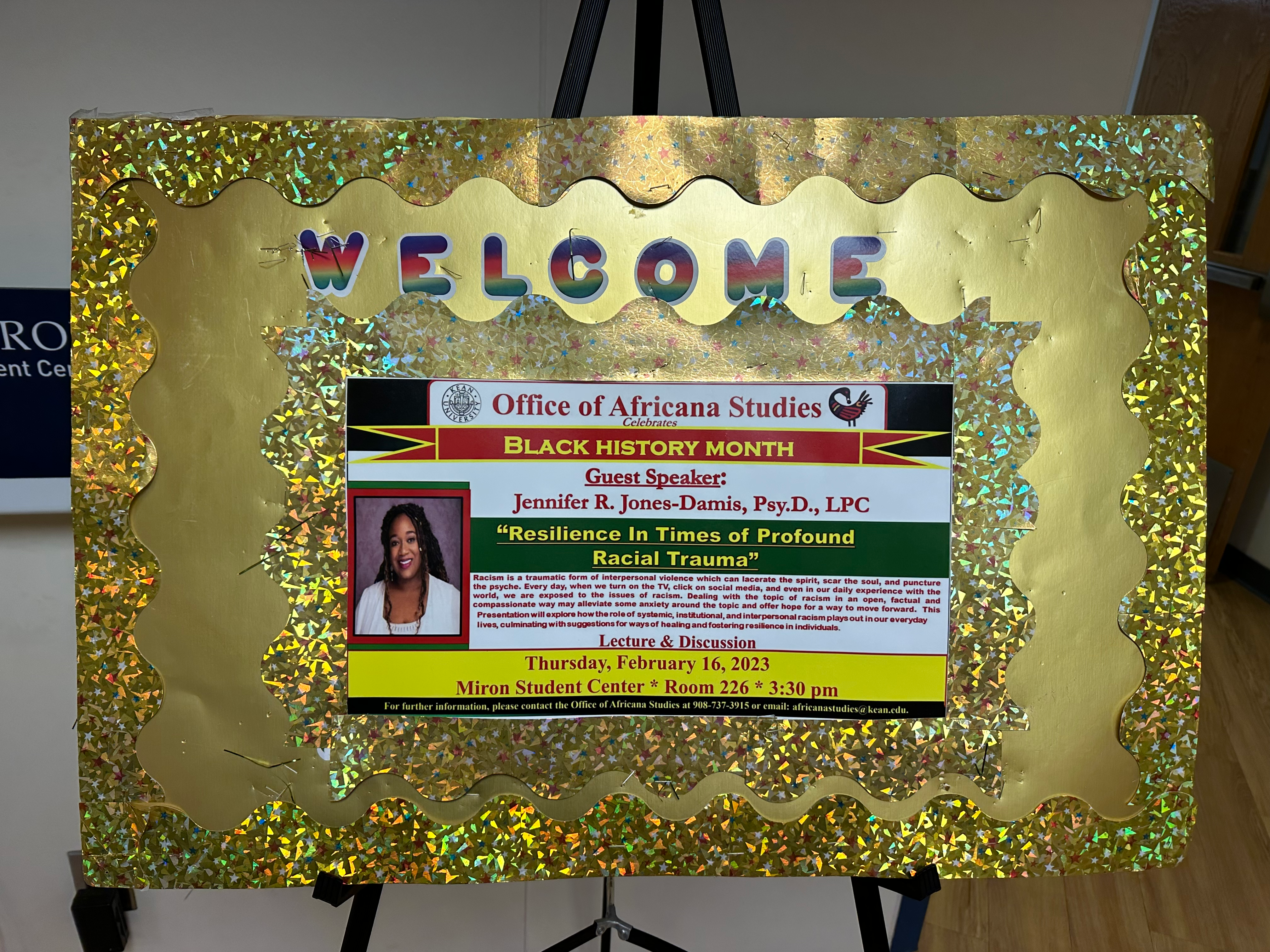By Davaughnia Wilson | Published February 21, 2023
Repeated exposure to images and stories of racial violence can leave people of color, especially Black people, with racial trauma that can affect physical, emotional, and psychological functioning, according to an expert on the topic.

In a talk called “Resilience in Times of Profound Racial Trauma,” Jennifer R. Jones-Damis, Psy.D., LPC., director of counseling, and psychiatric services at Rutgers University spoke at Kean as part of the Office of Africana Studies celebration of Black History Month.
This year’s celebration themed “Exploring Black Resistance,” honed in on racism and racial trauma and explored how African Americans have resisted ongoing oppression in all forms.
Jones-Damis said understanding the difference between a traumatic experience and a racially traumatic experience is essential.
According to the Diagnostic and Statistical Manual of Mental Disorders, fifth edition (DSM-5) trauma is, “any experience that you have with actual or threatened death, serious injury or sexual violation.”
Hearing details over and over again regarding traumatizing events can indeed make you traumatized. Community violence and victimization can also cause severe trauma.
“Racial trauma is the stressful impact or emotional pain of your experience with racism, discrimination and racial violence,” Jones-Damis said. “You can directly experience it, so it can happen to you; you can witness it happening to someone else, and where a lot of us fall, is repeated exposure to details of a racially traumatic event.”
Just seeing racial trauma on the news, on social media, and watching videos can cause someone to become traumatized. That is, vicarious racial trauma, experiencing racial trauma indirectly in media outlets.
Seeing racism more, day by day, and talking about it more also has a strong impact. Seeing it in real-time, according to Jones-Damis, shows how impactful vicarious racial trauma can be.
Vicarious racial trauma is very different for people of color and Black people in general. As Black individuals, watching another Black person get hurt directly in front of you is a different level of trauma.

“The fear of ‘that could’ve been me’ is different,” Jones-Damis said.
Kalasia S. Ojeh, Ph.D., assistant professor in the school of social sciences at Kean, was in attendance and voiced her experience with vicarious racial trauma when Breonna Taylor was murdered. She said she did not know about Taylor’s death until two months later because news outlets in that area weren’t reporting Taylor’s death massively.
Ojeh said as a Black woman, she felt uncomfortable when she finally heard of Taylor’s death and when it started to dominate news outlets. For two months she was unaware of Taylor’s brutal murder. For two months, she was living unaware.
She didn’t know it at the time but the discussion allowed her to reflect and acknowledge that she was indeed traumatized. She experienced the trauma vicariously through the media, thinking that could have been her.
Jones-Damis said everyone responds to trauma differently. For Ojeh, she went out to protest, and that is when David McAtee was murdered, another racially traumatic event.
“Repeated exposure to images and stories of racial trauma in communities or in news coverage can impact individuals’ emotional, psychological, behavioral, and physical functioning,” Jones-Damis said.
Racial trauma, however, is not limited to racial violence and aggression, which is often passed down from generation to generation. It also includes but is not limited to, racial harassment, microaggressions, bias, and xenophobia.
Quoting the article ‘Invisible Wounds of Racial Trauma,’ by Kenneth V. Hardy Ph.D. Jones-Damis stated that “racial trauma is a form of interpersonal violence which can lacerate the spirit, scar the soul, and puncture the psyche.”
Microaggression is what Jones-Damis calls micro assaults, “death by 1,000 cuts.” They can be either overt and conscious, explicit or subtle, slights or insults, and verbal or nonverbal.

Jones-Damis said racial trauma is like any other trauma. It isn’t something you “just get over.” Enduring racism and discrimination is a part of racial trauma.
Individuals often question a Black person’s trauma and their experiences but don’t question other traumas.
She gave the example of sexual assault. If someone claims to be sexually assaulted, the question isn’t “are you sure?” But when it comes to a Black person’s racial trauma, the question is “well, are you sure that was a microaggression? Are you sure they weren’t just complimenting you on your hair when they touched it?”
She added that individuals often do not intend to inflict microaggression on another person, but they do. It is about the impact it has on the receiver.
“As individuals, we assume that the language we use doesn’t derive from a system of inequality,” Ojeh said.

You must be logged in to post a comment.